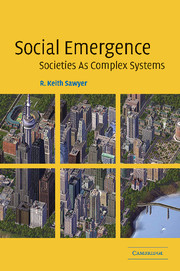Book contents
- Frontmatter
- Contents
- List of figures and tables
- Acknowledgments
- 1 Emergence, complexity, and social science
- 2 The third wave of social systems theory
- 3 The history of emergence
- 4 Emergence in psychology
- 5 Emergence in sociology
- 6 Durkheim's theory of social emergence
- 7 Emergence and elisionism
- 8 Simulating social emergence with artificial societies
- 9 Communication and improvisation
- 10 The Emergence Paradigm
- References
- Index
3 - The history of emergence
Published online by Cambridge University Press: 10 May 2010
- Frontmatter
- Contents
- List of figures and tables
- Acknowledgments
- 1 Emergence, complexity, and social science
- 2 The third wave of social systems theory
- 3 The history of emergence
- 4 Emergence in psychology
- 5 Emergence in sociology
- 6 Durkheim's theory of social emergence
- 7 Emergence and elisionism
- 8 Simulating social emergence with artificial societies
- 9 Communication and improvisation
- 10 The Emergence Paradigm
- References
- Index
Summary
Emergence is a central concept in third-wave systems theory. The term “emergence” often appears in writings by first- and second-wave theorists, but these theorists did not present a foundational argument concerning emergence. This lack of foundational clarity has led to the problems that I noted in Chapters 1 and 2: that “emergence” has been used in widely varying and often contradictory ways by theorists in different paradigms and different disciplines. My goal in this book is to provide a foundational account of social emergence, one that will allow social scientists to evaluate and reconcile these varying conceptions of the individual-social relation.
In this chapter, I begin the exploration of social emergence by going back to the source: the very first writings on emergence. Discussions of emergence began among philosophers in the mid-nineteenth century. The nineteenth-century founders of both psychology and sociology were heavily influenced by these discussions, and they each engaged with emergentist theory in their works. An awareness of this history can offer an important perspective on contemporary discussions of emergence. My goal therefore is to present an account that is not simply of historical interest but that will be a valuable background when I move on to clarify competing contemporary conceptions of emergence in psychology (Chapter 4) and in sociology (Chapter 5).
Atomism, holism, and emergentism
Since the nineteenth century, most physical and biological scientists have been reductionist atomists, believing that the only scientific way to understand a complex system is to first analyze it into its component parts, then discover the rules and laws that describe these components, and finally analyze interactions among the parts.
- Type
- Chapter
- Information
- Social EmergenceSocieties As Complex Systems, pp. 27 - 45Publisher: Cambridge University PressPrint publication year: 2005



